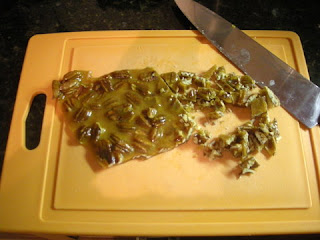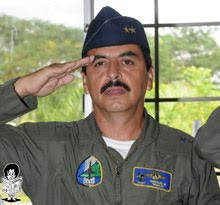The government of Honduras needs to be reminded that freedom of expression is a human right that has nothing to do with nationality.
The Honduran constitution (1982) prohibits foreigners from carrying out political activities, but to stretch the definition of 'political activities' to include writing opinion articles is a clear violation of the rights granted by the member states of the United Nations (of which Honduras has been a member since 1945) and the Organization of American States. Honduras was suspended from active participation in the OAS on July 5, 2009, but was still expected to "fulfill its obligations as a member of the Organization, in particular with regard to human rights".
The following are excerpts from the related documents. The complete documents are also available in other languages, including Spanish, at the links given. Emphasis is mine.
The following is from the United Nation's Universal Declaration of Human Rights:
On December 10, 1948 the General Assembly of the United Nations adopted and proclaimed the Universal Declaration of Human Rights the full text of which appears in the following pages. Following this historic act the Assembly called upon all Member countries to publicize the text of the Declaration and "to cause it to be disseminated, displayed, read and expounded principally in schools and other educational institutions, without distinction based on the political status of countries or territories."
....
Article 2.
* Everyone is entitled to all the rights and freedoms set forth in this Declaration, without distinction of any kind, such as race, colour, sex, language, religion, political or other opinion, national or social origin, property, birth or other status. Furthermore, no distinction shall be made on the basis of the political, jurisdictional or international status of the country or territory to which a person belongs, whether it be independent, trust, non-self-governing or under any other limitation of sovereignty.
....
Article 19.
* Everyone has the right to freedom of opinion and expression; this right includes freedom to hold opinions without interference and to seek, receive and impart information and ideas through any media and regardless of frontiers.
From the OAS's Declaration of Principles on Freedom of Expression:
PREAMBLE:
REAFFIRMING the need to ensure respect for and full enjoyment of individual freedoms and fundamental rights of human beings under the rule of law;
AWARE that consolidation and development of democracy depends upon the existence of freedom of expression;
PERSUADED that the right to freedom of expression is essential for the development of knowledge and understanding among peoples, that will lead to a true tolerance and cooperation among the nations of the hemisphere; CONVINCED that any obstacle to the free discussion of ideas and opinions limits freedom of expression and the effective development of a democratic process;
....
PRINCIPLES
1. Freedom of expression in all its forms and manifestations is a fundamental and inalienable right of all individuals. Additionally, it is an indispensable requirement for the very existence of a democratic society.
2. Every person has the right to seek, receive and impart information and opinions freely under terms set forth in Article 13 of the American Convention on Human Rights. All people should be afforded equal opportunities to receive, seek and impart information by any means of communication without any discrimination for reasons of race, color, sex, language, religion, political or other opinions, national or social origin, economic status, birth or any other social condition.
....
5. Prior censorship, direct or indirect interference in or pressure exerted upon any expression, opinion or information transmitted through any means of oral, written, artistic, visual or electronic communication must be prohibited by law. Restrictions to the free circulation of ideas and opinions, as well as the arbitrary imposition of information and the imposition of obstacles to the free flow of information violate the right to freedom of expression.
From the Organization of American States Inter-American Commission on Human Rights:
AMERICAN DECLARATION OF THE RIGHTS
AND DUTIES OF MAN
(Adopted by the Ninth International Conference of American States, Bogotá, Colombia, 1948)
....
Article IV. Every person has the right to freedom of investigation, of opinion, and of the expression and dissemination of ideas, by any medium whatsoever.
Article 13 of the American Convention on Human Rights.
Freedom of Thought and Expression
1. Everyone has the right to freedom of thought and expression. This right includes freedom to seek, receive, and impart information and ideas of all kinds, regardless of frontiers, either orally, in writing, in print, in the form of art, or through any other medium of one's choice.
2. The exercise of the right provided for in the foregoing paragraph shall not be subject to prior censorship but shall be subject to subsequent imposition of liability, which shall be expressly established by law to the extent necessary to ensure: a. respect for the rights or reputations of others; or b. the protection of national security, public order, or public health or morals.
3. The right of expression may not be restricted by indirect methods or means, such as the abuse of government or private controls over newsprint, radio broadcasting frequencies, or equipment used in the dissemination of information, or by any other means tending to impede the communication and circulation of ideas and opinions.
4. Notwithstanding the provisions of paragraph 2 above, public entertainments may be subject by law to prior censorship for the sole purpose of regulating access to them for the moral protection of childhood and adolescence.
5. Any propaganda for war and any advocacy of national, racial, or religious hatred that constitute incitements to lawless violence or to any other similar action against any person or group of persons on any grounds including those of race, color, religion, language, or national origin shall be considered as offenses punishable by law.
Ironically, the Honduran government ignores clear violations of number 5 above while going after someone with an opposing political opinion. Again, for anyone celebrating this attack on freedom of expression, please think about it. The next time it may be an attack on your freedom of expression or the people you agree with.
Related article: Honduras attacks freedom of expression
The Honduran constitution (1982) prohibits foreigners from carrying out political activities, but to stretch the definition of 'political activities' to include writing opinion articles is a clear violation of the rights granted by the member states of the United Nations (of which Honduras has been a member since 1945) and the Organization of American States. Honduras was suspended from active participation in the OAS on July 5, 2009, but was still expected to "fulfill its obligations as a member of the Organization, in particular with regard to human rights".
The following are excerpts from the related documents. The complete documents are also available in other languages, including Spanish, at the links given. Emphasis is mine.
~~~~~~~~~~~~~~
The following is from the United Nation's Universal Declaration of Human Rights:
On December 10, 1948 the General Assembly of the United Nations adopted and proclaimed the Universal Declaration of Human Rights the full text of which appears in the following pages. Following this historic act the Assembly called upon all Member countries to publicize the text of the Declaration and "to cause it to be disseminated, displayed, read and expounded principally in schools and other educational institutions, without distinction based on the political status of countries or territories."
....
Article 2.
* Everyone is entitled to all the rights and freedoms set forth in this Declaration, without distinction of any kind, such as race, colour, sex, language, religion, political or other opinion, national or social origin, property, birth or other status. Furthermore, no distinction shall be made on the basis of the political, jurisdictional or international status of the country or territory to which a person belongs, whether it be independent, trust, non-self-governing or under any other limitation of sovereignty.
....
Article 19.
* Everyone has the right to freedom of opinion and expression; this right includes freedom to hold opinions without interference and to seek, receive and impart information and ideas through any media and regardless of frontiers.
~~~~~~~~~~~~~~
From the OAS's Declaration of Principles on Freedom of Expression:
PREAMBLE:
REAFFIRMING the need to ensure respect for and full enjoyment of individual freedoms and fundamental rights of human beings under the rule of law;
AWARE that consolidation and development of democracy depends upon the existence of freedom of expression;
PERSUADED that the right to freedom of expression is essential for the development of knowledge and understanding among peoples, that will lead to a true tolerance and cooperation among the nations of the hemisphere; CONVINCED that any obstacle to the free discussion of ideas and opinions limits freedom of expression and the effective development of a democratic process;
....
PRINCIPLES
1. Freedom of expression in all its forms and manifestations is a fundamental and inalienable right of all individuals. Additionally, it is an indispensable requirement for the very existence of a democratic society.
2. Every person has the right to seek, receive and impart information and opinions freely under terms set forth in Article 13 of the American Convention on Human Rights. All people should be afforded equal opportunities to receive, seek and impart information by any means of communication without any discrimination for reasons of race, color, sex, language, religion, political or other opinions, national or social origin, economic status, birth or any other social condition.
....
5. Prior censorship, direct or indirect interference in or pressure exerted upon any expression, opinion or information transmitted through any means of oral, written, artistic, visual or electronic communication must be prohibited by law. Restrictions to the free circulation of ideas and opinions, as well as the arbitrary imposition of information and the imposition of obstacles to the free flow of information violate the right to freedom of expression.
~~~~~~~~~~~~~~
From the Organization of American States Inter-American Commission on Human Rights:
AMERICAN DECLARATION OF THE RIGHTS
AND DUTIES OF MAN
(Adopted by the Ninth International Conference of American States, Bogotá, Colombia, 1948)
....
Article IV. Every person has the right to freedom of investigation, of opinion, and of the expression and dissemination of ideas, by any medium whatsoever.
~~~~~~~~~~~~~~
Article 13 of the American Convention on Human Rights.
Freedom of Thought and Expression
1. Everyone has the right to freedom of thought and expression. This right includes freedom to seek, receive, and impart information and ideas of all kinds, regardless of frontiers, either orally, in writing, in print, in the form of art, or through any other medium of one's choice.
2. The exercise of the right provided for in the foregoing paragraph shall not be subject to prior censorship but shall be subject to subsequent imposition of liability, which shall be expressly established by law to the extent necessary to ensure: a. respect for the rights or reputations of others; or b. the protection of national security, public order, or public health or morals.
3. The right of expression may not be restricted by indirect methods or means, such as the abuse of government or private controls over newsprint, radio broadcasting frequencies, or equipment used in the dissemination of information, or by any other means tending to impede the communication and circulation of ideas and opinions.
4. Notwithstanding the provisions of paragraph 2 above, public entertainments may be subject by law to prior censorship for the sole purpose of regulating access to them for the moral protection of childhood and adolescence.
5. Any propaganda for war and any advocacy of national, racial, or religious hatred that constitute incitements to lawless violence or to any other similar action against any person or group of persons on any grounds including those of race, color, religion, language, or national origin shall be considered as offenses punishable by law.
~~~~~~~~~~~~~~
Ironically, the Honduran government ignores clear violations of number 5 above while going after someone with an opposing political opinion. Again, for anyone celebrating this attack on freedom of expression, please think about it. The next time it may be an attack on your freedom of expression or the people you agree with.
Related article: Honduras attacks freedom of expression






















 Welcome to my Blogicito —
Welcome to my Blogicito — 








